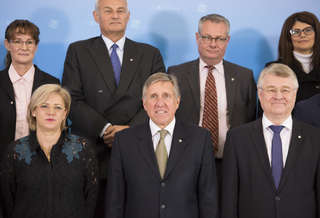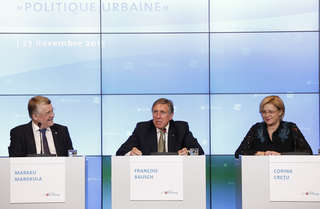The Minister for Sustainable Development and Infrastructure, François Bausch, chaired the informal meetings of EU Ministers for Regional Planning and Urban Policy in Luxembourg on 26 and 27 November 2015, in the context of the Luxembourg Presidency of the Council of the EU. The regional cohesion of Europe was a crucial point of discussion at the meetings.
It means finding solutions to the very unequal development of European regions and cities over the past decades – a trend which has grown with the economic and financial crises, as François Bausch explained during the press conference that followed the meetings on 27 November 2015. In his view, one of the more glaring consequences of the loss of EU cohesion is the unequal response to the migration crises.
Regional development
 On 26 November, the Ministers discussed concrete measures to bolster regional cohesion and its impact on Europe's growth and development.
On 26 November, the Ministers discussed concrete measures to bolster regional cohesion and its impact on Europe's growth and development.
"During our meeting, we discussed how we could maintain a balance in European regional development opportunities", stated François Bausch.
Fostering balanced regional development is, under the terms of the meeting's agenda, one of the avenues favouring inclusive and sustainable growth, which could counteract the brain-drain phenomena in rural areas, emigration, and depopulation.
The Ministers went through different regional scenarios in order to get a better grasp of what different kinds of regional challenges the EU would face in the future, for example migration and demographic changes. "During recent days, there have been many examples demonstrating at what point regional cohesion, and more particularly in transport matters, are important in Europe", said François Bausch.
The Ministers also discussed the instrument put forward by the Luxembourg Presidency to reinforce cross-border cooperation and improve living and working conditions in border regions. In the Minister's view, numerous obstacles of a legal or regulatory nature still exist in these regions, such as different technical standards in cross-border equipment or access for citizens of one country to the medical services of another country. Differences in transport systems were also raised.
The instrument suggested would consist of applying, on a voluntary basis and following the approval of regional or national authorities competent in the matter, the legislation or regulations of one country to the bordering country. It aims to build a European model of cross-border agreements with a view to undertaking specific cross-border projects.
"For a small country such as the Grand-Duchy of Luxembourg, cross-border cooperation and management plays an important role, and as a founding member of the EU, the spirit of cooperation has always been a core issue for Luxembourg", stated the Minister, referring to the Grand-Duchy's 250,000 cross-border workers.
Corina Creţu, the European Commissioner in charge of regional policy welcomed "all the efforts made up to now in taking concrete measures at Member-State level to integrate the regional dimension when implementing local, regional and national policies". In her view, the policies are "more effective" when they are "developed in the places where people live", therefore "more locally", and cannot be the same for each place. Moreover, discussions on the territorial agenda are happening and are unavoidable according to her.
After having called for an exchange of ideas and good practices between European countries in the matter of regional cohesion, the Commissioner stressed the need to take into account the fact that several countries are "novices" when it comes to regional development.
Regarding barriers to cross-border cooperation, Corina Cretu also highlighted the need to "see how obstacles could be removed", before mentioning that public consultation was underway on the matter. "I think that on this continent, which has known historic divisions, cross-border cooperation must be encouraged, for it is also a way of making the scars of history disappear", she said.
The President of the European Committee of the Regions, Markku Markkula echoed the words of François Bausch, highlighting the need for balanced regional development in Europe and more important regional cooperation, in particular based on the exchange of good practices. He regretted that the regional agenda had not been on the table of policy discussions recently, since the subject is important for the regions in Europe and that moreover, the Cohesion Fund represents one-third of the EU budget. Furthermore, he also called for greater attention to be paid to the regional dimension within the European legislative process. "The EU has to stop being regionally blind", he said.
Urban policy
 On 27 November, Ministers competent in urban policy matters discussed strategies to promote small and medium-sized cities as poles of attraction and service supply centres, in general and in a cross-border context. "We are calling for poly-centric development so as to ensure good living and working conditions for all European citizens", explained François Bausch. He explained that a significant part of the European population lives in small and medium size cities. And referring to the Grand Region, he further emphasised the need to explore the development potential in cross-border regions, which should be activated for the benefit of all of Europe.
On 27 November, Ministers competent in urban policy matters discussed strategies to promote small and medium-sized cities as poles of attraction and service supply centres, in general and in a cross-border context. "We are calling for poly-centric development so as to ensure good living and working conditions for all European citizens", explained François Bausch. He explained that a significant part of the European population lives in small and medium size cities. And referring to the Grand Region, he further emphasised the need to explore the development potential in cross-border regions, which should be activated for the benefit of all of Europe.
In this context François Bausch stressed that it is essential that the EU discusses the improvement in regional cohesion, not only "on a theoretical basis", but by providing concrete examples.
Finally, the Ministers focused on the urban dimension of the current refugees crisis, while towns would play an essential role in the short, medium and long terms, in the reception and accommodation of asylum seekers and in the integration of recognised refugees. They concentrated on the type of assistance which towns would need in order to solve problems regarding the urban scale of the refugees crisis, such as accommodation, skills training, (tackling) poverty and integration. François Bausch indicated that this point will be the subject of more in-depth discussions under the Netherlands Presidency of the EU.
On this subject, Corina Creţu called on Member States to look into how they could combine the Asylum, Migration and Integration Fund (AMIF), the European Social Fund (ESF) and the European Regional Development Fund (ERDF) with a view to addressing the consequences of the refugees crisis. She said that the EU is willing to accept "flexible use" of the ERDF. "The Commission is ready to support Member States in the search for solutions ", she also said. Markku Markkula for his part stressed the importance of focusing on how to best use structural and regional development funds and how to fast-track their use.
Last, the Ministers were informed on the progress on the EU's Urban Programme which, according to François Bausch and Corina Cretu, should be adopted under the Netherlands Presidency.
"We've launched four pilot projects to develop solutions to serious problems that cities have to cope with: urban poverty, housing, air quality, and the inclusion of migrants and refugees. I hope that by the Summer of 2016, I'll be able to present concrete projects linked to these themes", the Commissioner added.

